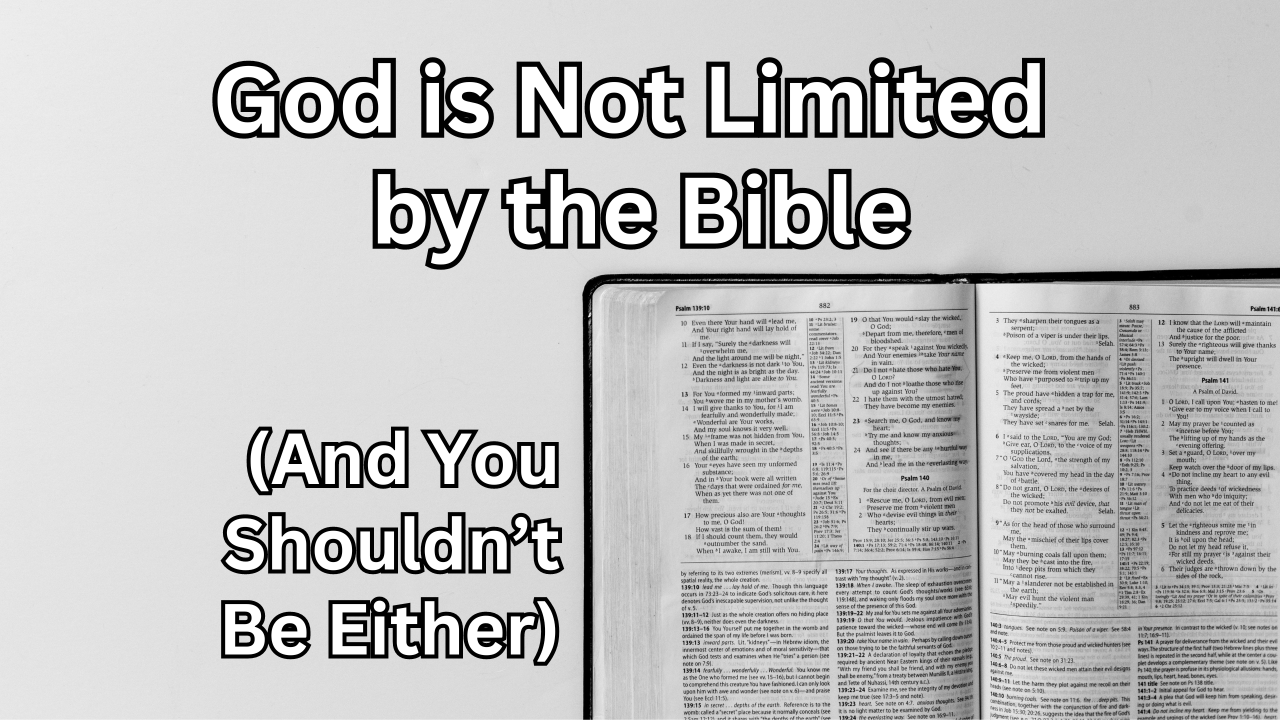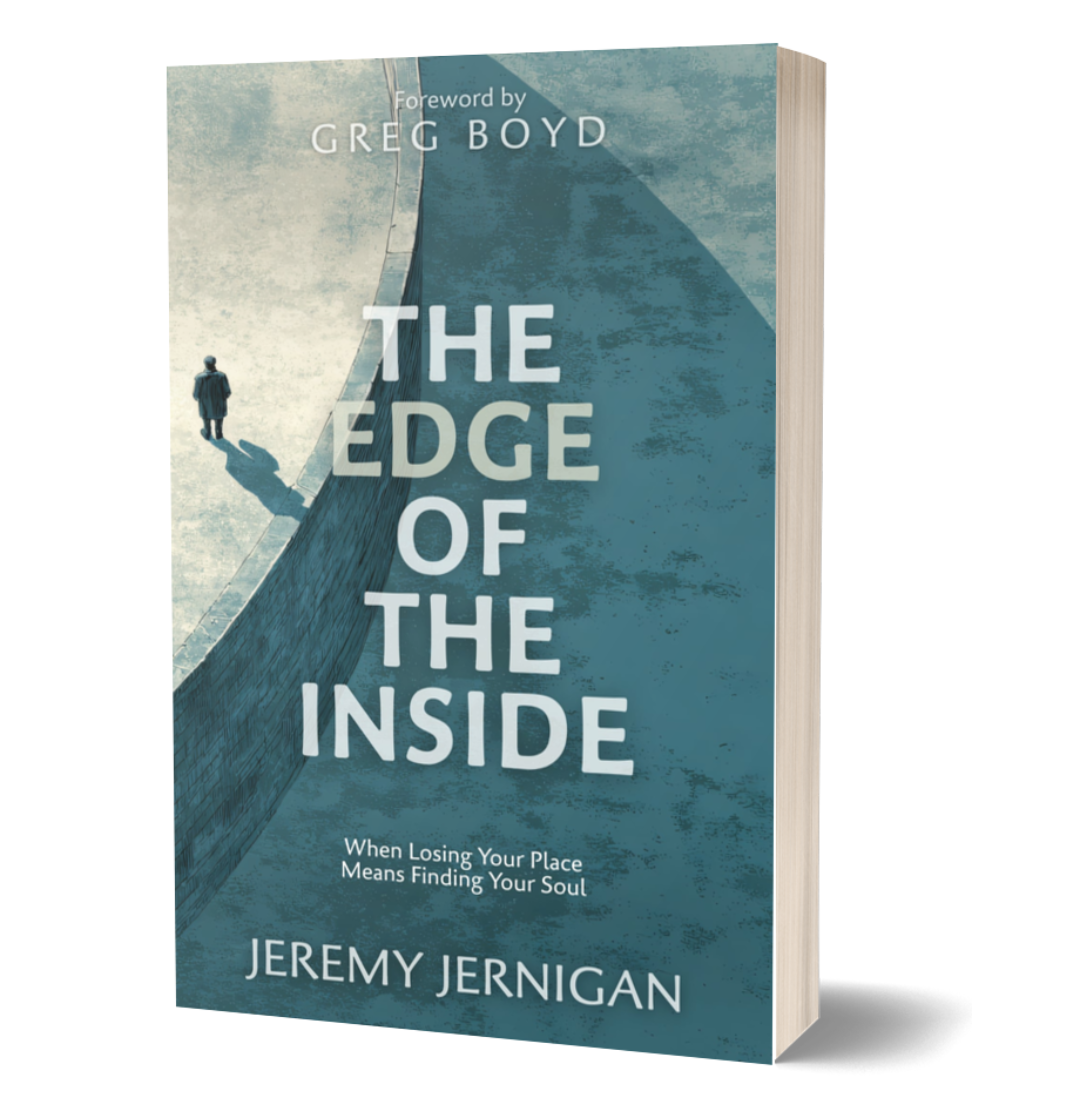God is Not Limited by the Bible

There have been numerous ways I've shifted my thinking over the last few years, but one of the most significant is how I read the Bible. For most of my life, I searched for a verse or specific reference to feel confident in the decisions I made or advice I gave to others. This is a byproduct of the version of Christianity many of us have experienced. In 1809, Alexander Campbell, one of the founders of the Restoration Movement (the tradition in which I was raised and have spent most of my life), said, “Where scriptures are silent, we are silent.”
That's why I often get the question, "Do you have a verse for that?" whenever I pose an idea about God to someone who has never heard it before. (Fun fact: I get asked this question so often about Universal Reconciliation—the idea that Jesus will save everyone—that I have an Evernote file with verses to copy and paste). The premise many Christians work from is that we cannot believe something unless we can find a verse to back it up.
Reading the Bible this way is a good place to start but not a good place to stay. That's because the Bible doesn't exhaustively cover everything, nor is that what it was ever intended to be. Without realizing it, you will allow this ancient text to become the ceiling of what God can do in your life. We got into this conversation a bit in the last episode of my Cabernet and Pray podcast. I interviewed my friend Mike Goldsworthy (see: Moving Beyond the Medium), who articulated this idea so well.
"In Galatians. Paul talks about the law and he says the law was this babysitter until Christ came. And so it was essentially like you needed this to grow up. You couldn't handle it until you grew up and I realized that's a lot of the ways that I needed the scriptures. I've been really informed by a guy named James Fowler and his work on stages of faith, and so this kind of thing makes a lot of sense to me. Within stages of faith and earlier stages of faith, you need like a lot more stricture. You need a lot more like these are the rules, this is what's right, this is what's wrong. It needs to be black and white. This is our tribe, this is not our tribe. So you needed the law as a guardian, it was a 'babysitter' is one way to translate it. It was helping you grow up. So you needed it. You needed it to operate in that kind of way." [slightly edited for readability]
Paul says it like this, "The law was our guardian until Christ came; it protected us until we could be made right with God through faith. And now that the way of faith has come, we no longer need the law as our guardian" (Galatians 3:24-25 NLT). Imagine yourself as a full-grown adult trying to hire a babysitter... for yourself. It would be laughably absurd. Or imagine an adult deciding only to eat baby food. Perhaps less laughable, this would cause you to be concerned for that person's mental health. Yet this is how many of us as seasoned Christians decide to read the Bible. We throw all critical thinking and reliance on the Spirit out the window when we look for whether a specific chain of words in a verse allows us to do what we sense God asking us to do.
Instead, we should learn to build on what we know and experience God in greater ways. As Mike explained:
"It's like this shift in stages of faith... you have had these rules, you've built this structure in order to make life make sense, to make a good, fulfilling, full life make sense. But then you move into a place where Richard Rohr would say you are filling the structure. You're no longer building it; you're filling it. And where you move, you've been informed by all this in such a way that it's just a part of you, and it catalyzes you into a trajectory. You're now living in the trajectory rather than needing to go back... like 'Here's the situation coming up, I've got to go back and figure out chapter and verse. What do I do with this thing?' That makes sense at an earlier stage of faith; you need that. But then you, gradually, you grow, you expand into more mature stages of faith where you live by the Spirit, and you're on a trajectory and you can improv your way based off of the trajectory that's been embedded within you." [slightly edited for readability]
We start by asking: "Is there a verse for this?" But eventually, you should move beyond that question and spend more time asking: "What direction is the Bible pointing me?" This will allow you to invite the Spirit to guide you forward beyond what has already been written down in the Scriptures, as Jesus argued in John 16:12-13. God is not limited by the Bible, and you shouldn't be either.
Or as the Biblical scholar Peter Enns has said, "If we read the Bible today thinking that this God of creation, freedom, and mystery is bound by a book as if it were a contract, with nothing left to say, no further moves or surprises, we will miss much. The Bible tells us so."
Photo by Sixteen Miles Out on Unsplash
Sign up with your email and never miss a post!
We hate SPAM. We will never sell your information, for any reason.





